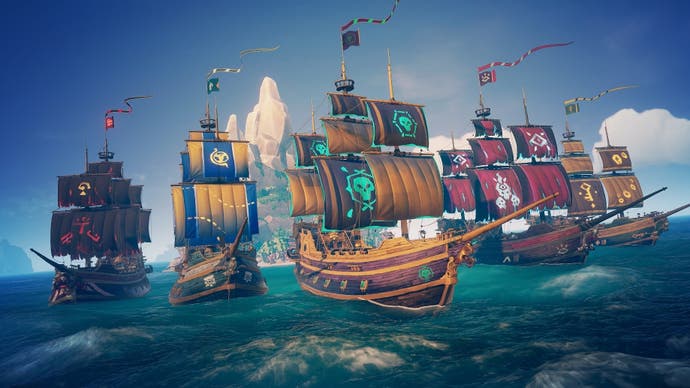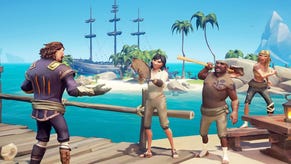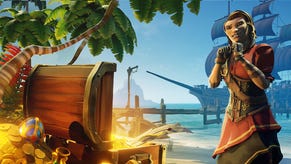Rare on Sea of Thieves' radical new Emissaries system and maintaining the PvE-PvP balance
The "biggest change-up to our sandbox" since launch.
Today sees the launch of Sea of Thieves' latest update, Ships of Fortune, and it's big 'un, redefining and expanding one of the core tenets of the launch-day game: trading companies. It's a fitting way to begin the multiplayer pirate adventure's third year of post-launch updates, but, of course, it arrives in strange times.
"We're lucky in that we work in a digital profession... and we get to pretty much carry on as normal broadly across the whole studio," explains Sea of Thieves executive producer Joe Neate of the studio's recent shift to working from home. "Very much during that transition and still now, the focus has been our team and how everyone is, how everyone feels... but seeing loads of people playing Sea of Thieves, hearing loads of great stories, there's a real great motivation for us to continue servicing that."
"The rhythm and that process and everything we've built around how we update has kind of put us in really good stead," continues Neate, "but this is still a big moment for us. This'll be our first update since we've shifted to working from home and I think that's going to be a really good moment for us as a studio and as a team... Not only is it our first update, it's one that has a tonne of cool stuff in, so I think it's going to have a real impact."
Indeed, despite current work challenges, today's update is perhaps the most substantial to arrive since last year's mammoth Anniversary offering. There are sweeping changes to Arena mode - which has been seriously streamlined to create a brisker, more combat-focussed loop - there are pet cats, a new revive mechanic, and, most notably, a radical new 'emissaries' system, expanding on the voyage-giving trading companies at Sea of Thieves' core.
Come the update's arrival, players will have the option of paying 20,000 gold to sign up as an faction emissary once they reach Level 15 in a trading company (each now has an increased level cap of 75, although players still only need to be Level 50 in three to become a Pirate Legend). This grants them a special flag that can be raised ahead of any voyage, resulting in dramatically increased rewards - which continue to climb as players complete more voyages and increase their emissary grade, as long as they avoid a watery death.
As Sea of Thieves' creative director Mike Chapman explains, the new emissary system is, in part, designed to fill a gap in the "quintessential pirate experience" at the game's core, by introducing the sense of different factions going about their own particular business on the oceans, as if in the real-life Age of Sail. "The one experience we didn't have... is that sense of standing on the deck of your ship, using your spyglass, looking over at another ship, and not only making a judgement call on [its type and likely crew size], but what flag they're flying, what they're choosing to accomplish in this world."
More crucially, though, "It's answering a mechanical need," says Chapman, "where some ships are more than just complete mystery boxes; here, you know more about what a crew's intent is and that drives more interesting stories." The emissary system means players can, for example, immediately identify a Gold Hoarder ship and conclude they're more likely to have high-value treasure onboard - increasing the incentive to target specific vessels, thus introducing greater risk for participants as well as greater rewards.

It's an idea that draws on the learning from previous Sea of Thieves activities such as Gilded Voyages, where rewards were boosted specifically to encourage more high-stakes player interactions. "There's always a moment in time after these come out," Chapman explains, "where the world is just more full of loot, and there's more of these emergent stories happening because you've got people going after the loot, and people going after those people, and really [the emissary] system builds that into the game consistently."
And the stakes are higher than ever, especially given the introduction of the new PvP-focussed Reaper's Bones trading company in Ships of Fortune, specifically designed to target emissaries. Players that pledge their allegiance to the Reaper's Bones are charged with hunting down those ships flying an emissary flag, sinking them, and returning that flag to the Reaper's Hideout in order to claim their rewards.
"The grade of your emissary flag increases based on completing [a trading company's] activities but you also lose that grade if you sink your ship," explains Chapman, "and the value of that flag [for Reapers] will reflect what that ship has done in the world. The kind of scenarios we're designing that for, you could absolutely see a grade one Gold Hoarder emissary in the world, and maybe decide to leave them alone and come back later when they've done a few more activities - it allows you to choose when you want to go after them."
"In terms of knowing when people in the server are emissaries," continues Chapman, "you can look at the tables next to the trading companies, and there are little wooden ships signifying if that company has any emissaries in the world. If, say, you saw two ships on the Gold Hoarders table, you'd know those are out in the world but you don't know where they are - so there's an element of, do you want to hunt them, do you want to wait until you come across them? Whereas Reapers are always visible on the map, so you know where those player boss ships are - which is really what we're going for, kind of the players being the boss ships in the world."
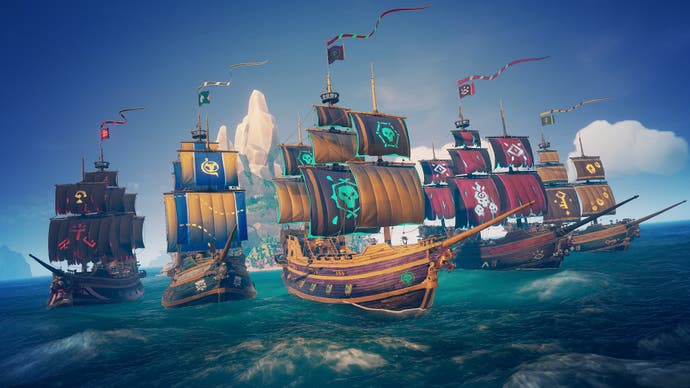
It's a system that will obviously live or die based on player engagement, especially given Sea of Thieves' relatively small ship limit per server, so I was curious to hear how Rare plans to ensure it remains attractive to crews.
"We've talked about that quite a lot," says Chapman, "and the main thing is ensuring people understand what makes emissary play special. If you opt-in to play that way, you absolutely will progress faster and gain access to unique rewards, so it's very much about making sure that rewards are meaningful to players. We'll always want that consistent, clear benefit for being an emissary, so it's very likely you're going to be on a server where there is an active emissary."
"But we really don't want this to become too predictable either," continues Chapman, "that's the thing we don't want in Sea of Thieves. It's about giving people the encouragement to interact with this mechanic, and then really being hands-off with it. We don't want to guarantee that we're going to bring servers together and that there are X amount of people that will also be emissaries in your server; we still want that sense of emergent, unpredictable play".
As Neate puts it, "This is the biggest change-up to our sandbox and to our progression system since we've launched really, and it's going to be one of those things where we're going to be observing and measuring and seeing how it's performing, and looking at if we need to evolve it... but we're as interested to see how it plays out as our players are, because ultimately we're going to be relying on what they do with those mechanics and how it all comes together."
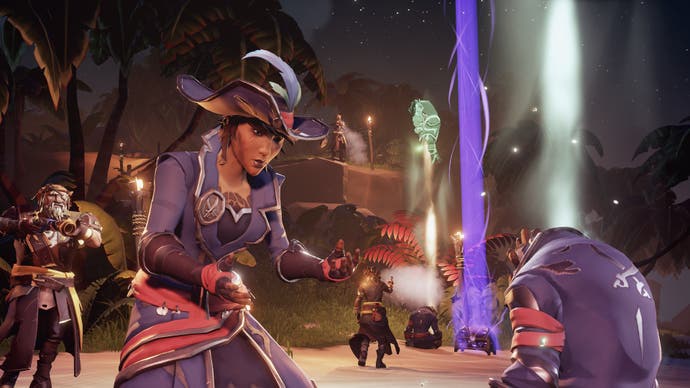
Understandably, there have been fears in the community that the emissaries system - which incentivises ship sinking - might ultimately tip Sea of Thieves' delicate balance of PvP carnage and quieter PvE thrills too far in the the direction of the former.
Rare, however, believes the emissary system's opt-in nature - and the fact Reaper's Bones players don't earn faction rewards for sinking non-emissary ships - will help protect PvP-shy players from unwanted attention in the long run, offering a "hiding space" for non-emissary players as they become lower value targets in the world.
And less confrontational players will be delighted to hear that the developer is looking to lessen the impact of PvP on other core areas of the game where necessary too.
That includes the story driven Tall Tales, which, in their current guise, are all too easily robbed of narrative momentum when players are forced to start over as a result of critical items being lost or stolen during PvP. The good news is that a solution is set to arrive relatively soon, introducing an exceedingly welcome checkpoint system to Tall Tales.
"We always believed that Tall Tales [should be played] in a shared world," says Chapman, "because of the positivity [around the emergent stories] that comes with that, but the negatives... the kind of excessive PvP leading to loss of time, loss of those physical items... there's a bunch of improvements that we've got planned".
To that end, starting in the update after Ships of Fortune, checkpoint saves will be added at key junctions during a Tall Tale. "The checkpoint is like an open book," explains Chapman, "and at any point you can leave the game, come back, vote on that open book, and you'll be able to pick up your checkpoint right from that point. And any physical items you had with you at that point in the tale... would pop back in on the table.
"So it both protects you against a loss of the items, but it also allows you to play in smaller chunks of play. I think one of the absolute fair criticisms of Tall Tales... was the requirement on players' time - but getting this to work in a sandbox world, where everyone can have different points of progress and tales can play out differently, has been a little bit more complex, but we've got a great solution now and it's coming very shortly."
And, of course, there's plenty more still on the horizon. Sea of Thieves is set to make its Steam debut in the not too distant future, bringing a new influx of players to its dangerous waters, and Rare will continue to deliver new monthly features and adventures - including building on "what it means to be a Pirate Legend", according to Chapman - for as long as it possibly can. "We're two years into a hopefully very, very long service for Sea of Thieves," says Neate, "and definitely our goal is to continue growing both the game and the audience that's playing."
"And the fundamental experiences you can have, right?" adds Chapman, "We definitely still want to surprise players as well."
